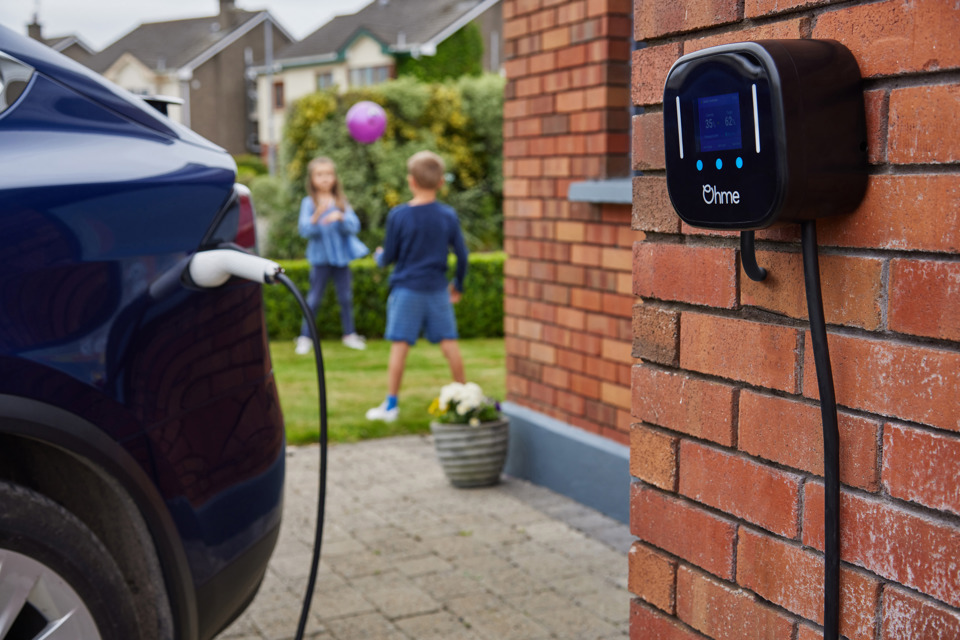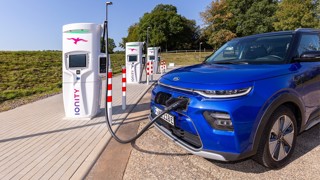The cost of charging an electric vehicle (EV) at home, on a standard variable tariff, is set to fall this winter.
Ofgem has confirmed the latest energy price cap rates, which fall from 30.11p/kWh to 27.35p/kWh.
The new rates take effect on Sunday (October 1).
It means the cost of driving 100 miles in a typical EV (averaging 4.0mi/kWh) will decrease from £7.53 to £6.80, if the vehicle is charged at home.
A full charge in a plug-in hybrid BMW 330e, meanwhile, will cost around £2.73 - for 35 miles of driving.
Ofgem energy price cap 2023:
|
|
Last price cap period (1 July - 30 September) |
New price cap period (1 October - 31 December) |
||
|
Electricity |
30.11p per kWh Daily standing charge: 52.97p |
27.35p per kWh Daily standing charge: 53.37p |
||
|
Gas |
7.51p per kWh Daily standing charge: 29.11p |
6.89p per kWh Daily standing charge: 29.62p |
||
EV drivers could expect savings of around £15 per month, when the new rates take effect.
For the first time since the energy price crisis started, the cost of charging for many drivers will fall below the mileage reimbursement rate for a typical EV.
Vehicles that achieve 4.0mi/kWh will cost 6p per mile to charge, under the new rates. The AER is currently set at 10p per mile.
For larger vehicles, that achieve 3.0mi/kWh, drivers will pay 9p per mile if they charge at home. Only those with the largest and most powerful EVs, and some vans, will be out-of-pocket.
The cost of using rapid and ultra-rapid public EV chargers – which any driver making journeys beyond the range of their car has to pay – finally stopped rising in September with prices likely to begin falling within weeks, according to new data from RAC Charge Watch.
It currently costs an average of 71.41p per kWh to ‘rapid’ charge an EV on a pay-as-you-go basis, up from 63.29p (13%) a year ago. This means drivers pay £36.56 to charge a family-sized electric car from 0% to 80%, which is most car’s rapid or ultra-rapid charging limit, giving a range of around 188 miles.
With electricity prices falling, the RAC expects to see a reduction in the prices charged by charge point operators (CPOs) in the coming weeks, making the cost to charge at both rapid and ultra-rapid devices cheaper than today.
RAC spokesman Rod Dennis said: “The fact charging prices – whether at home or at a public rapid or ultra-rapid charger – appear to have finally peaked can only be good news for drivers, whether they’re already lucky enough to drive an electric vehicle or are considering one as their next vehicle. It’s imperative now that charge point operators (CPOs) reduce their rapid and ultra-rapid charging prices as soon as they can to show they’re on the side of drivers."
> Interested in comparing electric vehicle data? Check out our EV tool.
> Interested in ensuring the efficient use of EVs. Check out our dedicated editorial sections: Insight & policy | EV news | Charging & infrastructure | Costs & incentives | Benefit-in-kind | EV case studies | EV road tests






















Sage & Onion - 12/09/2022 19:16
I think I am going to extend all our lease contracts that are due to expire next year by 12 months to let the supply chain issues and cost/discounts try to return to normal and in the meantime complete a thorough review of TCO for EV vs PHEV vs ICE again, but based on actual costs for drivers journey patterns, and not using HMRC AFR/AER rates or manufacturers published MPG's or miles/kWh. Most EV's look a no brainer on paper where TCO's use the AER rate, when the actual energy cost to run it can be 2 or 3 times the AER rate, depending on home or public rapid charging. It may only be our ESG strategy that keeps us invested in EV's, but if EV costs become unsustainable then we have a tough decision to make.